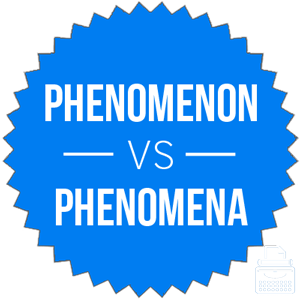Phenomenon vs. Phenomena – What’s the Difference?
Any time a star athlete performs well in his first season, sportswriters are quick to label the player a rookie phenomenon. Sometimes they might shorten it to phenom, but the meaning stays the same.
What if there is more than one such player making headlines in a given season? Are these two players phenomenons, or phenomena? Even if there is only one, is he or she a phenomena or phenomenon?
Given these words’ origins in ancient Greek, it’s unsurprising that some writers are confused by the difference.
What is the Difference Between Phenomenon and Phenomena?
In this post, I will compare phenomenon vs. phenomena. I will use each word in at least one example sentence, so you can see it in context.
I will also show you how to use a mnemonic device to make choosing phenomenon or phenomena a little easier.
When to Use Phenomenon
 What does phenomenon mean? Phenomenon is a singular noun. A phenomenon is something remarkable that happened, usually for unknown reasons or causes.
What does phenomenon mean? Phenomenon is a singular noun. A phenomenon is something remarkable that happened, usually for unknown reasons or causes.
Almost anything can be called a phenomenon as long as meets these criteria; unusual weather patterns, exceptionally talented athletes, and events in space.
Here are a few more examples,
- The airborne phenomenon was observed off the coast of Edinburgh at roughly 11pm last night.
- A seismic phenomenon caused the tectonic plates to shift and create a new lava flow to the surface.
- The Nationals, for all their annual contention, aren’t the Cubs, a beloved (or loathed) national phenomenon. –The Washington Post
Phenomenon is sometimes shortened to phenom, as in the phrase the rookie phenom Cody Bellinger. Either way, it means the same thing. Phenomenon has roots in ancient Greek, where the original word meant to appear or to show.
In philosophical contexts, a phenomenon is simply an observable fact or event, with no connotations of rarity or excitement.
When to Use Phenomena
 What does phenomena mean? Phenomena is the standard plural form of phenomenon. It means more than one unusual or remarkable occurrence, or in the context of philosophy, observable events.
What does phenomena mean? Phenomena is the standard plural form of phenomenon. It means more than one unusual or remarkable occurrence, or in the context of philosophy, observable events.
The sentences below are examples.
- Celestial phenomena were often unexplainable until the invention of the telescope.
- Several phenomena transpired at once to bring us to the current state of affairs.
- Most people know mirages as natural phenomena caused when hot air near the Earth’s surface bends light rays upward. In a desert, the effect prompts lost travelers to mistake patches of blue sky for pools of water. –The New York Times
What is the plural of phenomenon? The standard plural form of phenomenon is phenomena. Sometimes, however, writers mistakenly use phenomena as a singular noun and phenomenon as a plural noun. This is incorrect.
- Phenomenon is always singular.
- Phenomena is always plural.
Although deviations from this are incorrect, errors persists.
To make matters even more confusing, phenomenons sometimes appears as a plural in the context of a talented individual.
- Michael Jordan and Kobe Bryant are two basketball phenomenons.
In nonscientific writing, when referring to people, the plural phenomenons is accepted.
Trick to Remember the Difference
 Despite occasional usage to the contrary, you should use phenomenon as a singular noun and phenomena as its plural. There are no situations where deviating from this strategy would make a piece of writing simpler or more easily understandable.
Despite occasional usage to the contrary, you should use phenomenon as a singular noun and phenomena as its plural. There are no situations where deviating from this strategy would make a piece of writing simpler or more easily understandable.
- Phenomenon is only ever a singular word.
- Phenomena is its plural.
- Phenomenons is accepted when referring to people.
Phenomena vs. Phenomenon Check: Since phenomenon contains an extra N, like singular, you can always remember that phenomenon is a singular noun.
Summary
It is phenomena or phenomenon? Phenomenon is a noun that means an observable fact or event in philosophy, and more commonly something remarkable or unusual outside the world of philosophy.
- Phenomenon is the only acceptable plural form.
- Phenomena is its plural.
- In certain instances, phenomenons can be used as a plural.
Source, N;
Comments
Post a Comment